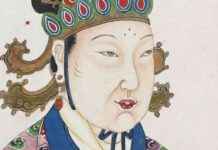For some time now, the Netherlands have had a “Black Achievement Month” in the fall. One might approve of that, in view of the colonial past that is still more clearly noticeable demographically here – compared to Germany – and a clearly visible proportion of the colored population, at least in the larger cities.
But why only “black” and not “coloured”? In Holland it’s mainly about immigrants from former Asian colonial areas. Although slaves were brutally traded by overseas trading companies, they did not play a major role in the historical everyday life of the mother country.
The Dutch National Opera is also taking part in the campaign month for the second time with a “black” opera premiere. In 2021, when the lockdown was still badly hit, it was less noticeable. But now there was the European premiere of “Blue”, a play by the famous Broadway composer Jeanine Tesori.
She is not black, but she has the activist Tazewell Thompson at her side as librettist and director, who in “Blue” mainly tells his story as a young, black man who was disciplined by the – blue-robed – police much more than his white peers – and 2019 anticipated the assassination of George Floyd.
The two-act play, which lasts a little over two hours, tells the story of a black policeman whose artist son, who has become angry because of the social grievances, gets into conflict with the cops and is shot by a fellow policeman. The first act exposes the milieu in Harlem with the mother’s friends and the father’s colleagues, who are happy about the birth and ends after a monologue from the son, who has grown up quickly, as an angry young man, with the mourning process in the church community, the pastor consoling, friends appeasement, suffering and accusation.
It’s all well done, sounds beautiful, touching, far too harmonious in the quartets, duos and arioso monologues. Tazewell and Tesori know their theatrical trade. He knows how to argue, to shake people up, but not to disturb them and then to calm them down again. She mixes jazz and gospel with Gershwin, Bernstein and rap, Puccini sweetness, Copland melancholy, lots of Afro percussion and well-placed, rarely prickly outbursts.
“Blue” is a bit predictable, but as instructive as it is entertaining. However, “Blue” does not come close to the power and originality of her multi-award-winning score for the musical “Fun Home” (2013) about a super-dysfunctional family, including the first visibly lesbian lead role in this genre.
The staging of the world premiere at the Glimmerglass Festival in Upper State New York, which was adopted from America, is similarly beautiful, comfortable and spectator-friendly. In front of a forbidding, white, classical house facade of the dominant view of society, a few pieces of furniture or office requisites indicate the living environment of the upright but disadvantaged black people. There is mainly lectures and reflections, but little action. Mostly motionless one sings in neat numbers, which reverberate for a long time. At the end of this quiet operatic requiem, a white coffin rolls out.
This almost feel-good opera, which is strongly text-driven about commitment, ambition and everyday injustice in minority neighborhoods in the USA, was well received in Amsterdam. A strikingly young, diverse audience, including many blacks, celebrated the committed, spirited Kwamé Ryan on the podium of the Residentie Orchestra from The Hague and the Black Power ensemble with Aundi Marie Moore (mother), Kenneth Kellogg (father) and Darius Gillard (son). in the leading roles.
With the easy-to-consume, but definitely sustainable “Blue”, the month of action worked. With a topic that is far away. Let’s see if the Dutch National Opera dares to take on the bloody and cruel story of slavery in their own trading companies. The Rijksmuseum Amsterdam presented an impressive exhibition on this in 2021. Now the music theater work, which also asks uncomfortable questions, is still missing.








